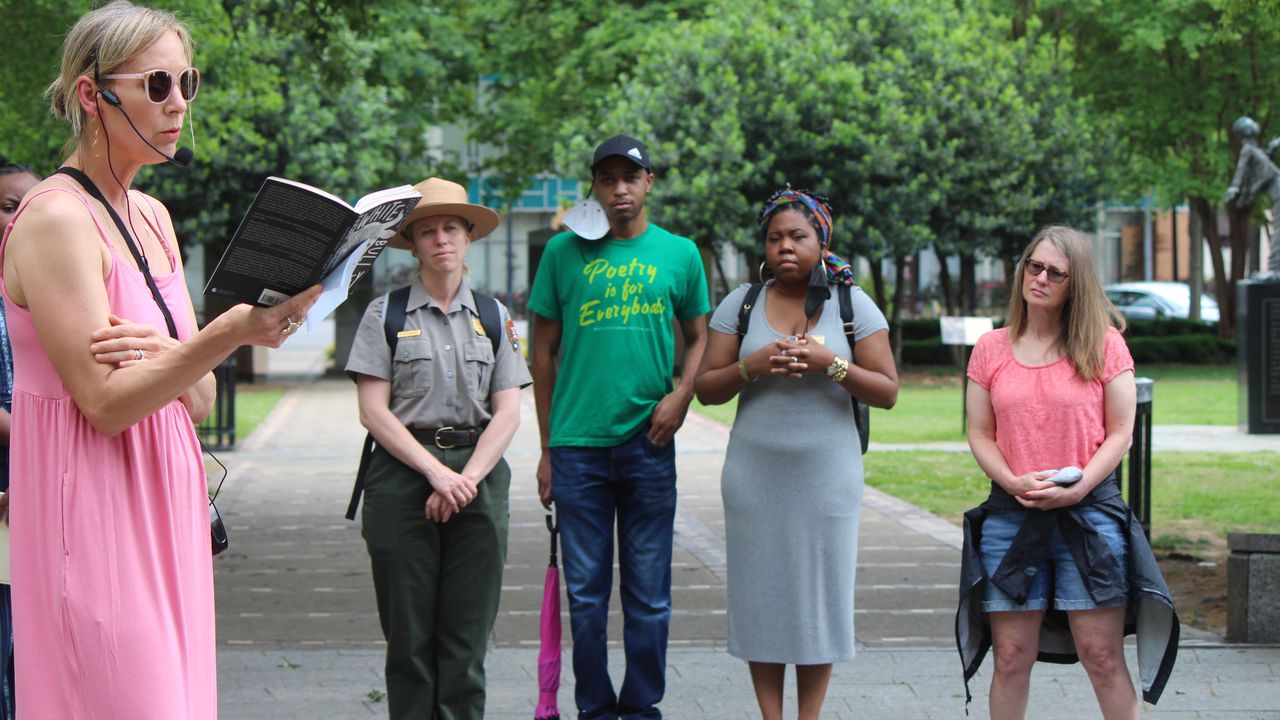Mobile, Birmingham to pick their own official poets laureate
Is there really a certain poetry to life in Mobile or Birmingham? We’re about to find out, as each of the two cities picks a poet to serve and represent it as city poet laureate.
Interested candidates still have time to apply for consideration, as the application process continues through the end of September. By year’s end, a local evaluation process will end with the mayor of each city making the final call.
The city poet laureate is a first-time program backed by the Alabama State Council on the Arts, which will fund the stipends paid to the poets selected. Executive Director Elliot Knight said the idea came in part from seeing how such programs had worked in cities outside Alabama, such as Columbia, S.C., and Chapel Hill, N.C. Aside from getting a little poetry into people’s lives and increasing general interest in poetry, he said, the poets also found ways to connect contemporary audiences to community history.
“There’s a lot of flexibility within it for it to kind of develop uniquely in any community that has one, and based on whoever that poet is,” Knight said.
He wants that to be the case in Alabama, where the state council is letting local agencies run the process rather than trying to implement a top-down approach.
“That was one of the big things for me,” Knight said. “I think the state council can play a role in helping support a program like that, but it really needs to be something that is developed and controlled at the local level.”
The state council’s role, he said, is to “connect the dots and provide the funding.”
The positions are defined the same way for both cities, and the selection processes are similar. In Mobile, the Mobile Arts Council is overseeing the process. In Birmingham, local partners are the Parks, Recreation, and Cultural Arts Committee of the Birmingham City Council and Create Birmingham.
The city laureates are to serve as “ambassadors for poetry” for a two-year term. “This is an honorary position and roles and responsibilities include making local appearances, facilitating public and educational programs, and building advocacy and community through poetry. The poet laureate will receive an honorarium of $5,000 over the course of their term and poems will be published by the City in the form of a book that will be made available during public events. Additional funds will be available for materials and other approved costs associated with community engagement programs that the poet laureate facilitates.”
Applicants must be 18 or older and must reside in the relevant city when they apply and as they serve; this means the Birmingham position is limited to residents of the city of Birmingham, not of outlying communities in the greater Birmingham area. They must “demonstrate a track record of public presentation of original poetry, including in-person and/or online events and via websites and social media, and have capacity and availability to attend periodic public events over the course of the two-year term.” Duties include hosting a specific number of workshops, participating in specified city events and writing original poems for the city.
The application process has been open since Aug. 1; Mobile submissions are due by 11:59 p.m. Oct. 1 and Birmingham submissions are due by 11:59 p.m. Oct. 2. In each city, “Poets will be selected for consideration by a distinguished community review panel” who will make recommendations to the mayor. In each city, the mayor will officially select the laureate.
In Mobile, interested poets can apply through the Mobile Arts Council at mobilearts.org. In Birmingham, candidates can apply through Create Birmingham at createbirmingham.org.
“Both of them were willing partners to kind of take it and run with it,” Knight said of Mobile Arts Council and Create Birmingham.
Representatives of both organizations say they’re hoping the impact will go well beyond the elevation of one poet. Lucy Gafford, executive director of Mobile Arts Council, and Viola Ratcliffe, Community Engagement Manager at Create Birmingham, said they hope to see widespread communal benefits.
“We’re hopeful that this program will lead to more creative writers and poets participating in programs and workshops to improve their abilities and establish a wider knowledge and appreciation of literary artists in our area,” said Gafford. “I think that’s the ultimate goal.”
“It’s our hope that by having a city poet laureate it will make poetry and creative writing arts more accessible to the residents of Birmingham because we’ll actually have someone placed in an honorary position to kind of advocate for poetry in the city,” said Ratcliffe.
Ratcliffe said she thinks the poets selected will find an eager collaborator and supporter in Alabama Poet Laureate Ashley Jones.
“It’s been really wonderful because Ashley Jones has actually been a consultant for us and helped us create this program,” she said. “We really worked closely with her to learn how the application process should go, what overall a poet laureate should be doing. … She’s been wonderful, she’s been such a huge asset in terms of that.”
Knight, Gafford and Ratcliffe all encouraged anyone interested to take a shot. Knight said his work at the Alabama State Council on the Arts has shown him that win or lose, the application process holds value for those who apply. For example, even those who aren’t selected visual arts fellowships have their work exposed to people who are knowledgeable in the field, and that often leads to other opportunities down the road.
“Getting your work seen … is a great benefit of applying,” he said.
“We would encourage you to apply,” said Ratcliffe. “Look at the website, look at the application. If you have questions, please speak out, we’re happy to chat with you about it. We’re really excited for this opportunity, and we encourage anyone who has an interest … to get your applications in, we encourage you not to wait to the last minute, definitely go ahead and submit.”
